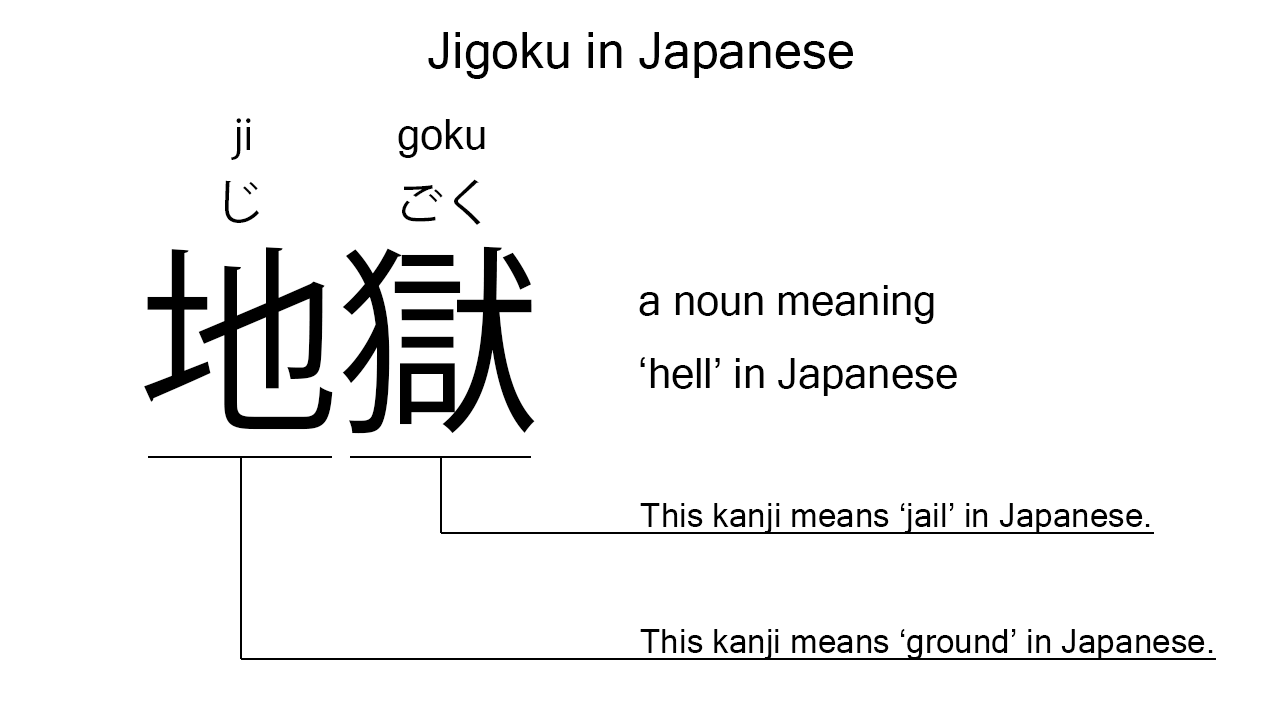What does “jigoku” mean in Japanese?
Native speakers say “jigoku” to mean ‘hell’ in Japanese. Perhaps, some Japanese learners know this word as it is sometimes used in Japanese movies, video games, novels, manga, anime, and the like. In this blog post, however, I will explain this word in detail based on its kanji expression. And also, I will explain how to use it through example sentences. My explanations would help Japanese learners understand “jigoku” more clearly. Then, let’s get started!
Contents
Definition and meaning of “jigoku”
Let me start with the definition and meaning of “jigoku”.
- jigoku – 地獄 (じごく) : a noun meaning ‘hell’ in Japanese.
Native speakers use this noun to refer to hell in Japanese. In addition, they sometimes use this as a metaphor for a place like hell. So, the usages are very similar to those of “hell” in English, I think.
The definition and meaning are simple and clear. To understand this noun more clearly, however, let me explain its kanji characters in detail, one by one.
Jigoku in kanji
The kanji expression of “jigoku” consists of the following two kanji characters:
- 地 : a kanji character used to mean ‘land’, ‘ground’, or such in Japanese.
- 獄 : a kanji character used to mean ‘jail’ in Japanese.
These two kanji characters tell us that “jigoku” literally means ‘ground jail’ in Japanese. This literal interpretation is not in line with the actual meaning, but still understandable. Many Japanese people believe that hell is the underground jail for souls.

When we meet new kanji expressions, we should check their kanji characters in detail to understand their meanings clearly and deeply. In many cases, kanji characters tell us a lot about the meanings of the expressions they form. Actually, here, we could get the better understanding of “jigoku” through the detailed kanji check above.
So far, I’ve explained the definition and meaning of “jigoku” together with its kanji characters. Then, let me explain how to use it through the example sentences below.
Example #1: how to say “hell” in Japanese
watashi tachi wa jigoku wo shinji masu – 私達は地獄を信じます (わたしたちはじごくをしんじます)
We believe in hell.
Below are the new words used in the example sentence.
- watashi – 私 (わたし) : a pronoun meaning ‘I’ in Japanese.
- tachi – 達 (たち) : a suffix used after a noun or pronoun to make its plural form. In the example, this is used after “watashi” to make its plural form, “watashi tachi”, which means ‘we’ in Japanese. Learn more about Japanese plural.
- wa – は : a binding particle working as a case marker or topic marker. In the example, this works after “watashi tachi” to make the subject in the sentence.
- wo – を : a case particle used to make the object word in a sentence. In the example, this is used after “jigoku” to make the object in the sentence.
- shinji – 信じ (しんじ) : one conjugation of the verb, “shinjiru“, which means ‘to believe’ in Japanese. In the example, it has been conjugated for the better connection with its following word.
- masu – ます : an auxiliary verb used after a verb to make it polite. Probably, this is well known as a part of Japanese masu form. In the example, this is used after “shinji” to make it sound polite.
This is a typical usage of “jigoku”. In this example, it works together with the case particle, “wo”, to become the object in the sentence.
Example #2: another usage of “jigoku”
boku no gakkou wa jigoku desu – 僕の学校は地獄です (ぼくのがっこうはじごくです)
My school is hell.
Below are the new words used in the example sentence.
- boku – 僕 (ぼく) : a pronoun meaning ‘I’ in Japanese. This is used mainly by boys and young males.
- no – の : a case particle used after a noun or pronoun to make its possessive case. In the example, this is used after “boku” to make its possessive case, “boku no”, which means ‘my’ in Japanese.
- gakkou – 学校 (がっこう) : a noun meaning ‘school’ in Japanese. This can also work as plural.
- desu – です : an auxiliary verb used after a noun or adjective to make it polite. Probably, this is well known as a part of Japanese desu form. In the example, this is used after “jigoku” to make it sound polite.
This is another typical usage of “jigoku”. In this example, it works as a metaphor for the place like hell. When we want to mean ‘hell’ in Japanese, anyway, this noun is always a very good option.
Summary
In this blog post, I’ve explained the definition and meaning of “jigoku” in detail based on its kanji expression. And also, I’ve explained how to use it through the example sentences. Let me summarize them as follows.
- jigoku – 地獄 (じごく) : a noun meaning ‘hell’ in Japanese. Japanese native speakers sometimes use this noun as a metaphor for a place like hell. So, the usages are very similar to those of “hell” in English, I think. These two kanji characters literally mean ‘ground jail’ in Japanese. This literal interpretation is not in line with the actual meaning, but still understandable. Many Japanese people believe that hell is the underground jail for souls.
Hope my explanations are understandable and helpful for Japanese learners.